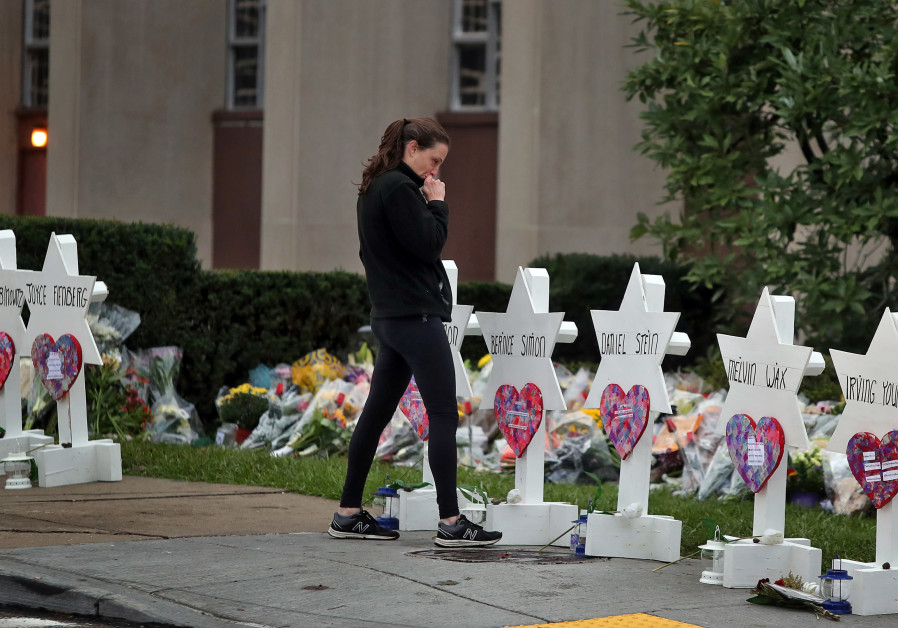From her mouth to God’s ears, reflecting on the Pittsburgh attack

A woman reacts at a makeshift memorial outside the Tree of Life synagogue following Saturday’s shooting at the synagogue in Pittsburgh, Pennsylvania, U.S., October 29, 2018. (photo credit: CATHAL MCNAUGHTON/REUTERS)
Squirrel Hill is a wonderful place to be Jewish. It is a safe place to raise a family. It is a community that cares and invests in its children and values its elders.
Growing up in Pittsburgh, I thought all American cities were full of synagogues, temples, and shuls. I just assumed that hearing Yiddish spoken on streets lined with Judaica shops and kosher delis was common everywhere. But Squirrel Hill is unique. Squirrel Hill is special.
My mother, Evelyn, was an English teacher in Squirrel Hill, and her love for Shakespeare was unabashed. I had the privilege of being her student in eighth grade and suffered as one might expect as the child of a hypercritical mother and teacher. That year, in her classroom, we picked apart and analyzed Macbeth. The question of man’s inherent nature was answered over and over through reading and discussion and in my mother’s favorite format – the five-paragraph essay.
My mother also taught Holocaust seminars in Pittsburgh and explored the same question, this time through accounts from survivors who lived in our community. I could never understand why she would put herself through those seminars, as they inevitably led to tears, heartache and rage. Weren’t humans inherently evil?
Immerse yourself in images of the Shoah – death camps, mass graves, gas chambers – and what other answer could there be? Listen to stories of children climbing out of those graves, nearly suffocated by the cold bodies of their dead family members. And now, imagine being in the main sanctuary of Tree of Life Synagogue last Saturday after 11 of our friends, family, parents and grandparents were massacred for being Jewish. How could man be anything but evil?
Robert Bowers was described by neighbors as “unremarkably normal.” Minutes before using a legally purchased automatic assault rifle to massacre a group of unarmed Jews in a sanctuary, he wrote that he couldn’t “sit by and watch my people get slaughtered.” He suggested that HIAS was bringing “invaders” into his country. How could this man be so fearful of an organization that provides support for people fleeing war, persecution and violence? The idea that an initiative so steeped in humanity could threaten and bring out the worst in a fellow American is horrific and beyond confusing.
Last Shabbat, our community was attacked by a terrorist. He didn’t climb over a fence or sneak through a border. He is not a part of the caravan of families coming from Central America that are to be met with 5,000 American soldiers (double the amount of American troops that are in Syria). He is an unremarkably normal, white, American man.
Considering the tribal politics that sow fear and division among our fellow citizens, encouraged by hateful rhetoric at the highest levels of our so-called leadership, this should not surprise us. But neither should it surprise us to see the strength of the Squirrel Hill Jewish community on display in the face of such unimaginable horror.
And it should not surprise us to see the City of Pittsburgh rally in support of its fellow citizens. Two days after the tragedy at Tree of Life, Pittsburgh’s Muslim community came forward and offered support for the victims and families of victims. They raised money for medical and funeral expenses, offered protection outside of synagogues and provided escorts to the grocery store for those who felt scared or threatened.
Despite all evidence to the contrary, my mother believed man was inherently good. She buried a son killed in action in Israel and spent part of her professional life immersed in the horrors of the Holocaust. But she believed Macbeth was not born evil – he was driven to it by ambition and fear.
My mother would have wanted to be in Squirrel Hill right now, to bear witness and to mourn and to be with her people. Instead, I imagine her somewhere in heaven, still going on about the virtues of the five-paragraph essay. But I take some comfort in the message that she strove to impart to so many hundreds of her students – that the essence of humanity is the triumph of good over evil.
From her mouth to God’s ears.
Michael Solomonov is the Israeli-American chef and owner of the Philadelphia restaurant Zahav, as well as the eateries Abe Fisher, Dizengoff, Percy Street Barbecue and Federal Donuts. He co-wrote the Israeli cookbooks Zahav and the just-released Israeli Soul and has won multiple James Beard Awards.
Join Jerusalem Post Premium Plus now for just $5 and upgrade your experience with an ads-free website and exclusive content. Click here>>






Comments are closed.